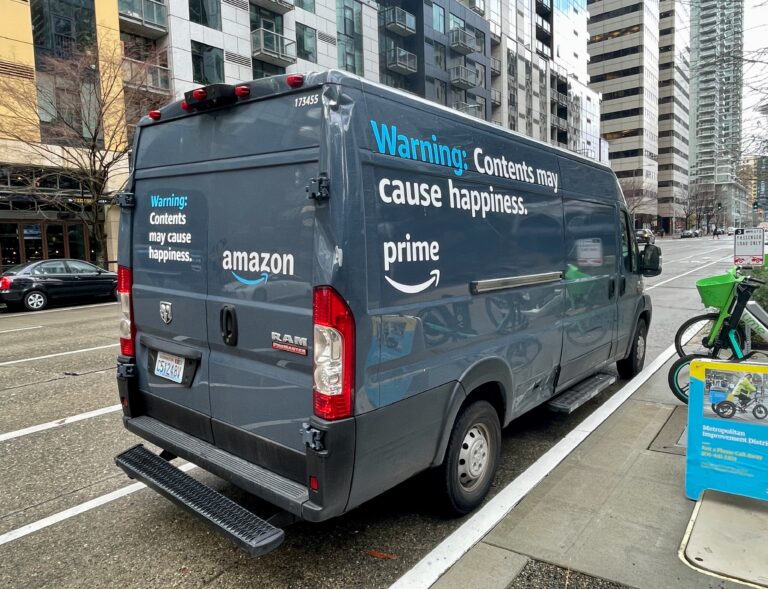The Federal Trade Commission, in conjunction with 17 state attorneys general, has officially filed a long-anticipated antitrust lawsuit against Amazon. The complaint, filed in a federal court in Seattle, accuses Amazon of leveraging its dominant market position to raise prices, compromise product quality, and unlawfully exclude competitors, ultimately harming fair competition. This legal action has caused Amazon’s stock to drop by up to 3% during afternoon trading.
The FTC outlined a dual-pronged approach through which Amazon allegedly maintains its monopoly power. Firstly, it highlighted Amazon’s use of anti-discounting measures that penalize sellers and discourage other online retailers from offering more competitive prices than Amazon, effectively keeping prices higher for products throughout the internet.
Secondly, the FTC claimed that Amazon essentially compels sellers to utilize its costly fulfillment services in order to obtain the sought-after Prime badge for their products. This results in increased expenses for conducting business on the platform, with sellers paying a significant portion of their earnings to Amazon. FTC Chair Lina Khan revealed that sellers are paying Amazon $1 for every $2 they earn.
The FTC and the states further alleged that Amazon forces sellers to incur expensive fulfillment and advertising fees to promote their products on the site, leaving them with no viable alternative but to depend on Amazon for their business survival. These tactics have had a detrimental impact on the shopping experience on Amazon, as search results become inundated with “pay to play ads” that steer shoppers toward pricier and less relevant products, according to Khan.
In essence, the statement highlights a dispute between the Federal Trade Commission (FTC) and Amazon. FTC Chair Lina Khan argues that Amazon is a monopolist using its power to raise prices and offer worse service, negatively impacting consumers and competitors.
Amazon’s general counsel, David Zapolsky, counters these claims, stating that their practices foster competition and innovation, benefiting both consumers and businesses.
The FTC’s lawsuit aims to hold Amazon accountable but doesn’t specify potential remedies like breaking up the company. Typically, in antitrust cases, liability is determined first, followed by discussions on remedies. This lawsuit is significant because it reflects Khan’s efforts to challenge existing antitrust norms and address Amazon’s dominance.
Amazon requested Lina Khan’s recusal from antitrust investigations into their business, arguing that her prior writings and criticisms indicated she had already formed opinions about the outcomes of such inquiries.
These charges mark the conclusion of years of pressure on federal authorities to address what some competitors, sellers, and lawmakers saw as anti-competitive practices by Amazon. The House Judiciary subcommittee on antitrust investigated Amazon, along with three other Big Tech firms, and found that it held monopoly power over most of its third-party sellers and numerous suppliers. It was alleged that Amazon strengthened its dominance by acquiring competing websites like Diapers.com and Zappos.
Back then, Amazon countered these allegations by asserting that large companies aren’t necessarily dominant, and the assumption that success is solely due to anti-competitive behavior is incorrect.
Amazon wields significant influence in the e-commerce industry, controlling roughly 40% of the market. The majority of sales on its platform are driven by independent sellers, including small and medium-sized businesses and individuals. Amazon generates substantial revenue by charging referral fees and offering services like advertising to enhance the visibility of sellers’ products on its platform.
Most third-party merchants also rely on Amazon’s fulfillment service for inventory storage and order shipping. Amazon has been consistently increasing fees for sellers using this service and recently introduced, then withdrew, an additional fee for some sellers, a move that faced criticism.
In the last quarter, Amazon reported revenue of $32.3 billion from third-party services. According to the Institute for Local Self-Reliance, these fees consumed 45% of U.S. sellers’ revenue in the first half of the current year, a significant increase from 35% in 2020 and 19% in 2014.
Amazon has faced ongoing accusations of unfairly competing with businesses on its platform by utilizing merchant data to create and promote its own competing products. In August, the company announced discontinuing certain in-house brands that were not well-received by customers, intending to reintroduce some products under existing brands like Amazon Basics and Amazon Essentials.
Additionally, there have been calls for the Department of Justice to investigate Amazon’s perceived monopoly power in the book and ideas market, with booksellers and authors expressing concerns about the company’s impact on the industry.
If the court case is successful, it could significantly benefit FTC’s Lina Khan, a prominent critic of Big Tech known for her 2017 scholarly work “Amazon’s Antitrust Paradox” during her time as a Yale law student. In 2021, Amazon had attempted to have her disqualified from agency investigations against the company due to her earlier criticisms.
During Khan’s tenure at the FTC, the agency has made aggressive efforts to curb the influence of Big Tech companies, but it has faced recent setbacks in high-profile cases. These include unsuccessful attempts to block Microsoft’s acquisition of Activision Blizzard and Meta’s purchase of the virtual reality startup Within Unlimited. The FTC is currently engaged in a lengthy lawsuit against Meta’s parent company, Facebook, accusing it of monopolistic behavior. Additionally, the Justice Department is challenging Google’s market power in court.
Some of the allegations made by the FTC in the Amazon case are similar to those presented in a separate lawsuit filed by the state of California last year. A related case filed by the District of Columbia was dismissed by a federal judge last year and is currently being appealed.
The federal complaint against Amazon is part of a series of actions taken by the FTC in recent months. In June, the agency sued Amazon, alleging deceptive practices in enrolling consumers into Amazon Prime and making it difficult for them to cancel their subscriptions. Amazon disputes these allegations. In late May, the company agreed to pay a $25 million civil penalty to settle charges of violating a child privacy law and misleading parents regarding data deletion practices on its voice assistant, Alexa.
(Source: Haleluya Hadero | AP | Lauren Feiner | Annie Palmer | CNBC)









